- Celebrating 12 Years
Success Stories
Resources / Success Stories
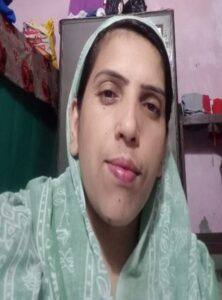 Salma Khatun, aged 25, is a resident of Janakpurdham Sub-Metropolitan City, Ward No. 6, Rahimpath. She had to drop out of school while studying in class 5 due to her family’s poor economic condition. Living with a disability made her journey even more challenging, particularly in continuing her education. Her father runs a small tailoring shop, and her mother is a housewife. Salma is the youngest of two sisters and two brothers.
Salma Khatun, aged 25, is a resident of Janakpurdham Sub-Metropolitan City, Ward No. 6, Rahimpath. She had to drop out of school while studying in class 5 due to her family’s poor economic condition. Living with a disability made her journey even more challenging, particularly in continuing her education. Her father runs a small tailoring shop, and her mother is a housewife. Salma is the youngest of two sisters and two brothers.
Despite these challenges, Salma developed valuable skills by learning embroidery work, applying mehndi designs, and adding borders (“false”) to sarees—skills she acquired from her father. Through this work, she now earns her own income and manages her daily life independently.
Her journey of transformation began when she started attending parent sessions conducted by Girls Champion Ajmeri Khatun in her community. Before these sessions, Salma had little knowledge about child marriage and its harmful impacts. Through regular participation, she became fully aware of the legal consequences and negative effects of child marriage.
These days, Salma not only participates actively in every session but also supports Ajmeri in organizing awareness sessions for parents. Whenever a case of child marriage is about to occur in her community, Salma immediately reports it to the Women’s Cell and informs Ajmeri Khatun. She openly tells community members that if anyone gets married before the age of 20, she will report it to the authorities. Thanks to her vigilance and commitment, not a single case of child marriage has occurred in her community over the past year.
Salma’s story is a powerful example of how, despite poverty and disability, an individual can become an active, skilled, and respected voice in their community. Her transformation highlights the impact of awareness-raising efforts, the importance of inclusive engagement, and the role of empowered community champions in driving social change.
 Dhiraj Kumar Yadav, aged 19, lives in Janakpurdham Sub-Metropolitan City, Ward No. 14. He comes from a middle-class family—his father runs a small business, and his mother is a housewife. Dhiraj is the eldest of three siblings, including a younger sister who studies at Sohani Ma. Vi Mujeliya School.
Dhiraj Kumar Yadav, aged 19, lives in Janakpurdham Sub-Metropolitan City, Ward No. 14. He comes from a middle-class family—his father runs a small business, and his mother is a housewife. Dhiraj is the eldest of three siblings, including a younger sister who studies at Sohani Ma. Vi Mujeliya School.
Dhiraj is the Chairperson of the Boys’ Club at Mujeliya School. From the beginning, he actively participated in Rupantaran and child marriage awareness sessions conducted by Girls Champion Ajmeri Khatun. Initially, he had very little knowledge about these issues, but after becoming the club chairperson, he became deeply engaged and began supporting Ajmeri in facilitating the sessions.
Through these sessions, Dhiraj gained in-depth knowledge about the negative impacts of child marriage and the importance of life skills covered in Rupantaran—such as critical thinking, behavior change, and making positive life choices. This learning had a profound impact on him. Dhiraj has not only committed to never becoming involved in child marriage himself, but he has also made a personal resolution to help his younger sister complete her education up to the master’s level.
He now raises awareness within his own family and actively advocates against child marriage in his community. Additionally, Dhiraj has performed in street/Kachahari dramas organized by LIFE Nepal under the IJOT(name of drama) campaign. These performances focused on issues such as child marriage prevention, the dowry system, gender-based discrimination, elopement, and the importance of girls’ education. In the drama, Dhiraj played the role of a father who takes a stand against the dowry system—performing in schools and public spaces across working municipalities.
Dhiraj dreams of becoming a pilot one day and is steadily working toward achieving that goal. His story reflects how empowered youth can become powerful agents of change when given the right knowledge, guidance, and opportunity.
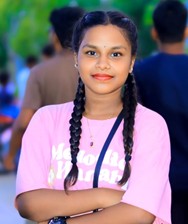 Jesika Das, a resident of Sabaila Municipality, Ward No. 4, comes from an economically marginalized family. Her father repairs bicycles and runs a small roadside shop in their village, while her mother works in the fields. Jesika has three sisters and one brother.
Jesika Das, a resident of Sabaila Municipality, Ward No. 4, comes from an economically marginalized family. Her father repairs bicycles and runs a small roadside shop in their village, while her mother works in the fields. Jesika has three sisters and one brother.
She is the Deputy Chairperson of the Girls’ Club at Sabaila School and successfully passed her Secondary Education Examination (SEE) this year. As the eldest daughter in the family, her grandmother had decided to arrange her marriage at an early age. At that time, Jesika had just joined the Girls’ Club. Although she had heard about child marriage, she didn’t fully understand its harmful consequences.
When Ranjita, a Girls Champion, began conducting awareness sessions at her school, Jesika gained deeper knowledge about the negative impacts of child marriage. Motivated by this understanding, she courageously spoke with her family and convinced them to let her continue her education. Seeing her dedication and performance in her studies, her parents agreed not to marry her off early.
Later, Jesika confided in Ranjita that she wanted to pursue further studies, but her family’s poor financial condition posed a serious challenge. Ranjita shared Jesika’s situation with the LIFE Nepal team. Understanding her potential and circumstances, LIFE Nepal provided seed money support, enabling her to continue her education.
These days, Jesika is preparing for the Public Service Commission (Lok Sewa) examinations and is working hard to secure a scholarship for higher education in college. With the support from LIFE Nepal and her own determination, Jesika is on the path to building a brighter future through education.
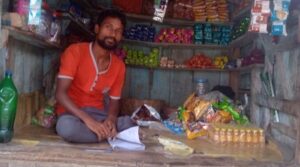 Aresh Kumar Pasman, 25, from Ward No. 20, Janakpurdham Sub-Metropolitan City, was born with a congenital physical disability. Despite holding a blue disability card (‘Kha’ category), Aresh faced discrimination throughout his school years, including social exclusion by classmates. Although he completed Grade 12 by giving tuition classes, he remained unemployed due to a lack of job opportunities and skill recognition. His family of six relied mainly on his parents’ social security allowance for survival.
Aresh Kumar Pasman, 25, from Ward No. 20, Janakpurdham Sub-Metropolitan City, was born with a congenital physical disability. Despite holding a blue disability card (‘Kha’ category), Aresh faced discrimination throughout his school years, including social exclusion by classmates. Although he completed Grade 12 by giving tuition classes, he remained unemployed due to a lack of job opportunities and skill recognition. His family of six relied mainly on his parents’ social security allowance for survival.
Aresh’s life changed when he came into contact with Apang Samaj Janakpur (Disabled Society Janakpur), where he learned about disability rights and began participating in community programs. He received mobile repair training but was unable to find employment. In Bhadra 2089, LIFE Nepal representatives visited Apang Samaj Janakpur, and Aresh learned about the Inclusive Climate-Resilient Community Development Project. With support from the project, he formed and led an SHG in his ward and later requested livelihood support. The project provided him with a cheque of NPR 35,000, which he used to start a grocery shop—purchasing a partition (NPR 15,000) and stocking grocery items (NPR 15,000).
Initially, Aresh struggled with transporting goods from wholesalers. With a recommendation from Apang Samaj Janakpur and utilizing his savings and the family’s social security allowance, he purchased a three-wheeled scooter from India. This enabled him not only to supply his own shop but also transport goods for others, earning NPR 800–1,000 per day. He now sends his children to a boarding school and has leased 10 kattha of land to grow food crops. Aresh is now recognized as a proactive youth leader and a respected figure in his village.
Aresh’s journey highlights the transformative power of combining skill-building with livelihood support and mobility solutions. The role of OPDs such as Apang Samaj Janakpur was vital in identifying and mentoring potential community champions. The project’s flexibility to adapt to individual needs, including mobility support, was key to sustainable outcomes.
 Rajgir Mandal, a resident of Ward No. 7, Tarapatti, Mithila Bihari Municipality, lives with a physical disability. His family of seven includes himself, his wife, three sons, and his elderly parents. Due to his disability, Rajgir could not engage in farming or wage labor and relied on a small tea shop for income. However, the limited income from the shop was insufficient to meet the basic needs of the family, especially expenses related to his children’s education and healthcare.
Rajgir Mandal, a resident of Ward No. 7, Tarapatti, Mithila Bihari Municipality, lives with a physical disability. His family of seven includes himself, his wife, three sons, and his elderly parents. Due to his disability, Rajgir could not engage in farming or wage labor and relied on a small tea shop for income. However, the limited income from the shop was insufficient to meet the basic needs of the family, especially expenses related to his children’s education and healthcare.
Rajgir participated in a Self-Help Group (SHG) meeting organized under the Inclusive Climate-Resilient Community Development Project implemented by LIFE Nepal with support from CBM Global. During the meeting, he shared his aspirations to expand his business and requested support in the form of grocery and snack shop items. Within a week, the project team visited his shop, assessed his needs, and documented required materials. On 28 June 2024 (2081/03/14), grocery and snack items worth NPR 43,776 were handed over to him in the presence of the Ward Chairperson.
Following the support, Rajgir has been running the grocery and snack shop successfully, earning NPR 500–600 daily. This consistent income has enabled him to support his children’s education, cover medical expenses, purchase clothing, and meet household needs. His confidence and independence have grown significantly, and he serves as an example of how timely and targeted support can transform lives.
The story of Rajgir illustrates the importance of listening to the needs of persons with disabilities and acting promptly. The intervention was effective because it was tailored to Rajgir’s capabilities and preferences. Partnering with local authorities and ensuring visibility of such support also strengthened the trust and transparency of the process.
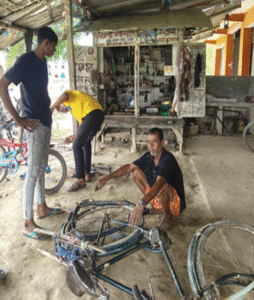 Chandeshwar Thakur, a 55-year-old resident of Mithila Bihari Municipality (Mithileshwar Ward No. 3), is with hearing visibility and had been relying on bicycle repair as his main livelihood. Despite his strong will to work and live independently, he was facing difficulty growing his business due to a lack of essential tools and materials. His limited income was barely enough to cover daily household expenses.
Chandeshwar Thakur, a 55-year-old resident of Mithila Bihari Municipality (Mithileshwar Ward No. 3), is with hearing visibility and had been relying on bicycle repair as his main livelihood. Despite his strong will to work and live independently, he was facing difficulty growing his business due to a lack of essential tools and materials. His limited income was barely enough to cover daily household expenses.
As a member of the Self-Help Group (SHG) under the Inclusive Climate-Resilient Community Development Project, Chandeshwar presented his needs in a group meeting. Recognizing his potential and the livelihood barrier he faced, LIFE Nepal supported him with the necessary bicycle repair tools and materials.
Following the support, Chandeshwar now is operating his bicycle repair shop daily. His income has increased to NPR 300–500 per day, of which he saves NPR 100 in a local cooperative. His sons assist him with managing shop logistics. This increased income has allowed him to contribute to household needs and support his grandchild’s education. His economic self-reliance has strengthened his confidence and dignity.
This story illustrates the importance of tailored livelihood support and inclusive project planning. Even small-scale economic support, when coupled with community engagement and SHG mechanisms, can lead to transformative outcomes for persons with disabilities. The project learned that SHG platforms are effective in identifying real needs and facilitating practical, sustainable support for marginalized individuals.
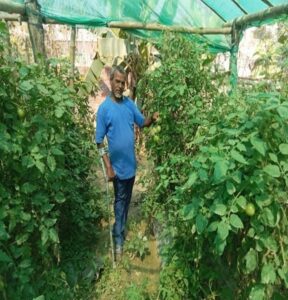 Bhagat Mandal, a 55-year-old from Ward No. 15 of Janakpurdham Sub-Metropolitan City, lives with a physical disability and supports a family of five through farming. Despite his dedication, his yields were low due to frequent crop damage from pests and diseases. He had no access to training or external agricultural support and relied solely on traditional methods.
Bhagat Mandal, a 55-year-old from Ward No. 15 of Janakpurdham Sub-Metropolitan City, lives with a physical disability and supports a family of five through farming. Despite his dedication, his yields were low due to frequent crop damage from pests and diseases. He had no access to training or external agricultural support and relied solely on traditional methods.
After Bhagat shared his challenges in SHG meetings, the LIFE Nepal team conducted a household assessment and recognized his need for knowledge and resources. Under the Inclusive Climate-Resilient Community Development Project, he was provided with training and a comprehensive package of modern, climate-adaptive farming inputs including drip irrigation, net houses, sprayers, mulching sheets, and organic farming materials.
Bhagat adopted climate-friendly agricultural practices and transitioned to off-season vegetable farming. His income surged to NPR 75,000 per season. He is now regarded as a lead farmer in his community. With increased earnings, he supports his father’s medical needs, his household expenses, and his son’s civil engineering studies in Kathmandu. He also purchased assistive devices to support his mobility.
Bhagat’s journey highlights the value of empowering persons with disabilities with both knowledge and resources. It demonstrates that inclusive agricultural support not only improves livelihoods but also boosts confidence, leadership, and community status. This case reinforced the project’s approach of delivering need-based, context-specific interventions through OPD and SHG platforms.
Mr. Bhagat Mandal Kebat, who resides in Janakpurdham-15, has a physical disability. He engaged in cow farming with support from the project, using climate-adaptive livelihood practices. He manages to collect 7 liters of milk daily, which he sells in the local market. Additionally, he produces organic fertilizer and pesticides for vegetable farming using cow urine and dung. Mr. Ramcharitra Thakur, the husband of a person with a physical disability, lives in Aurahi Rural Municipality. He operates a salon as part of an inclusive cultural entrepreneurship initiative. Similarly, Mr. Habib Dhobi, who resides in Mithila Bihari Municipality and has a physical impairment, runs a clothing ironing business in the local market. In addition to this, individuals like Mr. Mohammad Yusuf, Mr. Ramsagar Mandal Khatwe, and Mr. Jibachha Mahaseth, who live in Janakpur, along with Mr. Sunil Mandal and Mr. Jainul Dhobi in Aurahi, all having physical impairments, operate grocery shops in the local market. Meanwhile, Mr. Ganesh Rajak, an inhabitant of Mithila Bihari with a vision impairment, manages a stationary shop in Tarapatti Bazar. Lastly, Mrs. Hiradevi Mandal, who also resides in Mithila Bihari and has a hearing impairment, runs a grocery and breakfast shop in the local market, with the assistance of guardians, as part of micro-enterprises.
Manisha Rout is the daughter of Pukari Rout, a resident of Sabaila Municipality, Ward-6, Dhanusha, Madhesh Province. She studied at Shree Saraswati S. School, Thilla. During the Ending Child Marriage and Promoting Girls’ Education program, LIFE Nepal formed a Girls’ Club with the school head teacher, where Manisha was also selected as a club member. In the club, she learned about child marriage, its side effects, and the legal provisions against it. She actively participated in each monthly review meeting and all the club’s activities. After becoming aware of the issues surrounding child marriage, she shared everything she had learned with her family and community members.
Manisha is the eldest daughter in her family and has one younger sister. Manisha’s father works in Qatar. Her mother said they would marry their daughter when he returned from Qatar. Because they have two daughters, their parents wanted to marry Manisha off at an early age. Her father even started saving money in the bank for Manisha’s marriage. When Manisha joined and participated in the club, she wanted to convince her mother, but her mother was not convinced. In the parent session, her mother shared that in their community, boys and girls marry without their parents’ consent, often falling in love during school and eloping. She believed that if any daughter eloped, it would destroy the family’s reputation. Therefore, she thought child marriage could also help maintain reputation and save on dowry.
After attending several sessions regularly, her mother realized that what Ranjita shared about child marriage was true. Manisha’s mother had also married at a very young age and faced many problems, including health issues, financial difficulties, and dropping out of school. Manisha also convinced her mother not to marry her at an early age. Her mother decided that Manisha would complete her +2 exams before getting married. After Manisha completed her SEE exams, she joined a basic computer course in Sabaila Municipality during the three-month gap. Later, the municipality also provided an opportunity for her to complete the basic computer course.
The story of Riyansh Sada reflects the challenges faced by many children in impoverished communities, particularly in terms of access to healthcare and proper nutrition. Riyansh’s condition, marked by developmental delays and severe acute malnutrition, underscores the urgent need for intervention in such communities. The fact that he hadn’t received any vaccines further highlights the lack of access to essential healthcare services. The intervention by SM Prakash Dutta, who emphasized the importance of vaccination and facilitated Riyansh’s access to healthcare, is commendable. By bringing Riyansh to the nearest Urban health post and ensuring he received his first dose of vaccination, Prakash played a crucial role in potentially saving Riyansh from future health complications. It’s heartening to see Riyansh’s parents embracing the importance of vaccination and committing to completing his vaccination schedule. Additionally, the provision of supplementary materials such as Bal Vita and RUTF (Ready to use food) by the health post demonstrates a holistic approach to addressing Riyansh’s nutritional needs. As Riyansh continues to receive proper care and support, including home-made foods and healthcare supplements, there is hope for his improved health and development. This story underscores the significance of community engagement and access to healthcare in ensuring the well-being of vulnerable children like Riyansh.
11 years ago, Mrs. Koshila Devi (32 yrs), a native of India, married Mr. Tejawa Mushahar (48 yrs) from Aurahi Mun-9, Aglisara, Mahottari, Nepal. They have two daughters and one son, but due to the absence of a marriage registration certificate, their children lack birth registration documents, depriving them of governmental services and facilities. Tejawa, being a Nepalese citizen, desired to register their marriage and grant Nepalese citizenship to Koshila. Despite numerous visits to government offices, they faced difficulty understanding the legal procedures and counseling provided. This left them in a state of uncertainty. Recognizing their plight, a social mobilizer (SM) inquired about their challenges. They explained their unsuccessful attempts and requested assistance. The SM then approached the ward chairman, Mr. Raghunanda Chaudhary, and the ward secretary, Mr. Mukesh K. Singh, detailing their predicament and seeking clarification on the legal process. The ward secretary informed them that Koshila’s Indian birth registration certificate was required. Subsequently, the ward secretary guided Koshila and Tejawa through the process, outlining the necessary documents. Koshila obtained her birth registration certificate from her maternal home and, with the assistance of the SM, visited the ward office where they were provided with the marriage registration form. Upon completing the legal requirements, they obtained the marriage certificate. Following this, they applied for Koshila’s Nepalese citizenship, which was facilitated by a recommendation letter. The next day, they visited the citizenship office in Ramgopalpur, Aurahi Mun, where Koshila was granted Nepalese citizenship. Koshila, now a Nepalese citizen, is delighted with the outcome. She plans to register their children’s births soon, enabling them to access governmental services and facilities.
In Dharampur Sada Tole of Kanchanrup Municipality, Ward No. 12, where a Social and Behavior Change (SBC) intervention began in early March 2023, there are approximately 165 people living in 31 households. During the initial inquiry, Rambha Sardar, SBC SM, met with Dhaneshwor Sada, who shared the difficulties in obtaining a citizenship certificate for his 17-year-old daughter, Sita Sada. The issue stemmed from discrepancies in the mother’s name in legal documents due to the family’s migration from Theliya Tole, Ward No. 11, to their current location. This issue was resolved by issuing a referral letter from the municipality office confirming the identity of Sita Sada, enabling her to obtain her citizenship certificate. However, the news of Sita Sada receiving her citizenship certificate before marriage caused a scandal in the community. During subsequent visits, Rambha faced questions and discussions regarding the issuance of citizenship certificates to unmarried daughters. Some community members argued against issuing citizenship certificates before marriage, citing concerns about legal safety for daughters and the preference for the husband’s name on the certificate. Rambha countered these arguments by highlighting the benefits of obtaining a citizenship certificate before marriage, such as employment opportunities, financial independence, and the ability to participate in civic duties like voting. By January 2024, during Rambha’s follow-up visit, it was noted that individuals who previously opposed issuing citizenship certificates before marriage, including Bhunai Sada, had obtained citizenship certificates for their daughters. This shift in attitude was attributed to witnessing the positive outcomes of early citizenship issuance. Consequently, more parents in the community expressed willingness to obtain citizenship certificates for their daughters before marriage. Furthermore, it was observed that many daughters-in-law in Dharampur Sada Tole were married before turning 18 and had one or more children but lacked citizenship certificates. Some faced resistance from their husbands when requesting citizenship certificates, often citing trust issues within the marriage.
n Dome Tole of Pachayanpur, Kalaiya Sub-metropolitan City-19, 25 households accommodate an approximate population of 146, including 40 males, 35 females, 40 boys, and 31 girls under 18 years old. Shree Nepal Rastriya Adharbhut School, located nearby, offers education up to class 5, catering to children from Patel, Sah, Gupta, Sharma, Dome, and Muslim communities. Dome Tole was chosen for the implementation of the Social and Behavior Change (SBC) project, backed by UNICEF and executed by LIFE Nepal. During data collection for the community profile, Social Mobilizer (SM) Mrs. Min Kumari Lama discovered that children from Dome Tole were discontinuing their education due to feeling discriminated against at school. The guardian stated, “Our children enrolled in school to study but stopped attending due to unequal treatment, particularly during breakfast where Dome children were served on paper plates while others received steel plates.” This sentiment was echoed by the children themselves. Following this revelation, SM arranged a meeting with the ward chairperson to discuss the issue, but initial skepticism was met. Nevertheless, promises were made to investigate further. Subsequently, the District Coordinator (DC) and SM raised the matter with the headmaster and staff of the school, only to face denial, citing sensitivity in their approach. However, after continued coordination and advocacy by SM, a positive change was observed. The guardian and children expressed their gratitude, noting that after SM’s intervention, equality was restored, with Dome children now receiving their breakfast on steel plates like their peers. Consequently, Dome children resumed attending school, marking a successful outcome of the advocacy efforts.
Fifteen years old Shikshya (name changed) has said “No to her early marriage.” She has continued her studies and is committed to stop child marriage in her community. Born to a family of five, Siksha lives with her parents in Janakpur sub-metropolitan city of Dhanusha district in Madhesh province of Nepal. Coming from a financially poor background, it has been challenging for Shikshya’s parents to educate their children. Parents of two daughters, they find it difficult to cover household expenses. Understanding the need of giving dowry in daughter’s marriage and fear of daughters eloping, they see daughters as a burden to their family. As a result, Shikshya’s elder sister got married at an early age and has been struggling to survive for a living. In a society where child marriage is prevailing, Rupantaran program has been implemented in Sakal Bhawan Kanya Secondary School for 6 months. Four peer leaders from this school have been trained to advocate for stopping child marriage in their school/community. Shikshya heard about ongoing Rupantaran program from her friend (a peer leader) at her school. Shikshya is a student of grade 9 in same School and is a member of child club as well. She shared about her ongoing marriage talks at home. Her parents had been talking about her marriage. During that time, one of her friends (a peer leader) told her about ongoing Rupantaran program at her school. She informed about gender-based violence and consequences of child marriage. She had seen her elder sister suffering after marrying at an early age. She realized how risky it was to marry at an early age. Finally, Shikshya strongly opposed her marriage in front of her parents. She is dedicated towards her higher studies and convinced her family not to marry her below 20 years of age. Though her parents did not agree with her decision in the beginning, however, they allowed daughter to continue her studies later on after frequent consultations and counselling. Shikshya believes in herself and wants to be financially independent before marriage. Currently, she is in touch with her elder sister and keeps sharing about her learning to her elder sister.
Anupam Srivastav, 14-years old, is a Rupantaran Champion from Dhanusha district. He studies in grade 10 in Yagyabalkya Sanskrit Secondary Gyankup in Janakpur sub-metropolitan city. He has been selected as one of the peer leaders from his school who participated in peer leader training conducted by LIFE Nepal with the technical and financial assistance from UNICEF under “Empowering Adolescents for Addressing Child Marriage” program in the month of January 2024. Born to a family of five, Anupam lives with his family in Janakpur sub-metropolitan city of Dhanusha district. He describes himself as a shy and introvert person from his early age. He could not express himself to others. He was afraid of talking with girls. He was shy to talk to her sister. He could not share his views in front of many people. Anupam finds peer leader training very effective in bringing positive changes within himself. Learning the contents of Rupantaran package helped him to understand himself and people/society around him. “Section 2 of Rupantaran package introduced us to “Mero Sansar” chapter really helped him understand himself. There were many sections in Rupantaran package that introduced them to adolescence, sexuality and social inclusion, gender-based violence, etc. He understood about changes that comes in adolescence period, both in girls and boys. He bought sanitary pad for his sister after he came to know about her need. Now, he can express himself and speak in front of many people. Anupam expressed interest to support during parent meeting conducted nearby school area. He actively participated & expressed his views during parents meeting. He wants to pursue his career as a software engineer in future and serve his society and people by participating in various awareness raising activities on ending child marriage.
